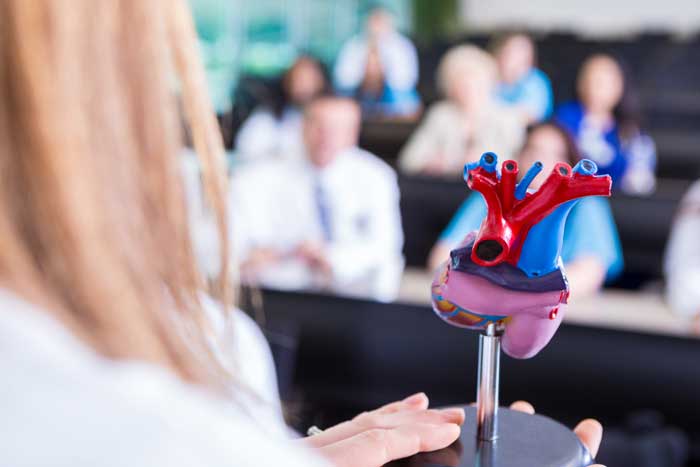Saint Leo University Announces New Bachelor's Degree Program: Health Education and Health Promotion
Students will be admitted to campus-based program starting with the Fall 2020 Semester.

Students will be admitted to campus-based program starting with the Fall 2020 Semester.

Saint Leo University announced the start of a new four-year degree—a bachelor's in health education and health promotion—that will prepare graduates for a growing number of health education positions at community organizations, healthcare agencies, and workplaces.
Health education specialists help the public understand how to cope with health challenges they face as individuals or as concerned family members. For instance, the specialists offer instruction in healthy habits and preventative measures that can be adopted, and provide information on what kinds of health care services are available to the public. The work of health education specialists includes developing new education programs for various groups, and improving education programs that may already exist.
Graduates from Saint Leo, in particular, will be educated to promote a "culture of health" wherever they work through effective teaching, through the examples they set as individuals who prioritize their own well-being, and through the cooperative working relationships they maintain with clinicians and other health professionals.
 "Health education specialists are bridging an important gap between what individuals, families, and communities know and understand, and the increasing amount of knowledge available," said Kathleen Van Eerden, PhD, RN, associate dean of Saint Leo's College of Health Professions. The number of job openings for health educators is expected to grow nationally by 11 percent from 2018 to 2028, according to the federal Bureau of Labor Statistics.
"Health education specialists are bridging an important gap between what individuals, families, and communities know and understand, and the increasing amount of knowledge available," said Kathleen Van Eerden, PhD, RN, associate dean of Saint Leo's College of Health Professions. The number of job openings for health educators is expected to grow nationally by 11 percent from 2018 to 2028, according to the federal Bureau of Labor Statistics.
"Saint Leo is excited to add this program. It fits so well with our university's Catholic Benedictine tradition, which emphasizes the balanced growth of body, mind, and spirit," said Van Eerden. "We continue to stress that lesson today. Adding this degree program is another way we can support that philosophy and provide interested students with a direct pathway into a meaningful career."
Saint Leo is launching the Bachelor of Science program in the fall 2020 Semester at the residential campus. Faculty anticipate that students most attracted to the program will be those with a keen desire to learn about health and to talk about it with others, and those who enjoy working with groups of people.
Strong courses and project-based learning experiences
The Saint Leo program will prepare them with a contemporary curriculum that draws from courses in anatomy, professional speaking, statistics, psychology, ethics, and nutrition, and layers upon those subjects courses in education and health promotion. The education courses, such as teaching diverse populations, brain-based learning, and assessing health learning, will ensure that students not only understand the material, but also are able to make it understandable to future clients.
 Saint Leo students themselves will learn through experiences and projects, as well as from readings and lectures conducted in small, personalized classes. During a "capstone" learning experience in their final year, students will work with a professional contact at a community agency on a project meant to help improve the health of a designated group. Afterward, the students will evaluate the project's success by applying professional standards. The strong Saint Leo liberal arts foundation courses will help the students attain the deep reading, writing, and analytical skills they will need to progress through this challenging course of study.
Saint Leo students themselves will learn through experiences and projects, as well as from readings and lectures conducted in small, personalized classes. During a "capstone" learning experience in their final year, students will work with a professional contact at a community agency on a project meant to help improve the health of a designated group. Afterward, the students will evaluate the project's success by applying professional standards. The strong Saint Leo liberal arts foundation courses will help the students attain the deep reading, writing, and analytical skills they will need to progress through this challenging course of study.
There will still be room in students' academic schedules for some elective courses, as well.
"This innovative curriculum really shows the benefit of a four-year university program for those interested in the field," Van Eerden said. "This is where a student can become well-rounded for the needs of the profession, as well as for their personal growth."
Open to transfer students
Students will be able to transfer into the Saint Leo program from other schools, but may need to take the program's foundational courses—including anatomy, ethics, speaking, psychology— before being able to progress into the upper-level courses.
At the end of this cohesive program of study, students can choose to take a national competency exam for the Certified Health Education Specialist credential. Some employers require the credential. In general, it is considered an asset for those in the field.
The Bachelor of Science in health education and health promotion is the first degree offering announced by the Saint Leo College of Health Professions, the university's newest academic unit. The College of Health Professionals joins the College of Arts and Sciences, the College of Education and Social Services, and the Tapia College of Business.
Media contact for interviews: Jo-Ann Johnston, Saint Leo University academic communications manager, at jo-ann.johnston@saintleo.edu or (352) 467-0843 (cell and text)